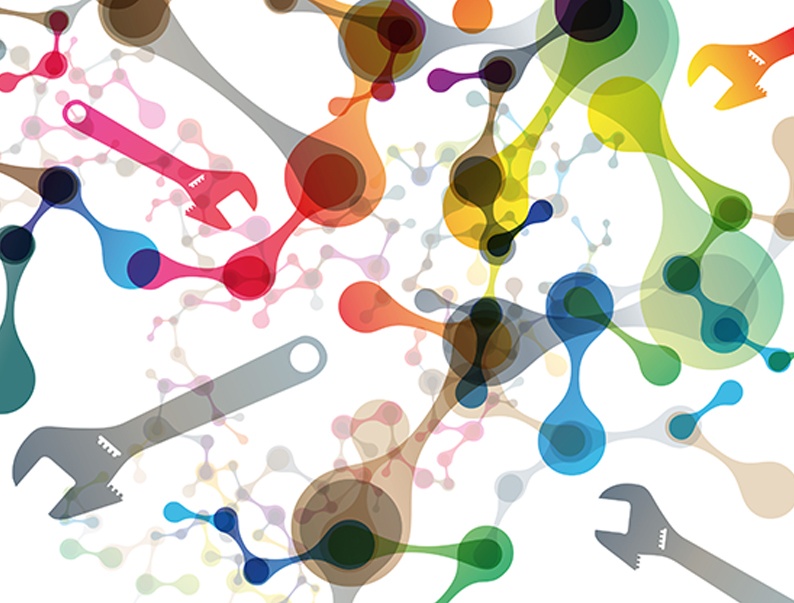Keywords:
By Beatrice Marg-Haufe
Research and technology development focused on synthetic biology (synbio) and systems biology are expanding, as are its real-world applications. Even as more traditional synbio approaches, which involve engineering microbes to produce novel drugs or chemicals and creating entirely new microorganisms, continue to advance, synbio innovations are driving the technology into advanced biofuels, biosensors, diagnostics, and other promising application areas.

There’s no telling what new worlds synthetic biology will lead us into.
Using synthetic biology, scientists can synthesize tailored DNA constructs designed to carry out specific functions not available in nature or produce whole genomes. The potential applications are wide-ranging and encompass the life sciences, fine and specialty chemicals, energy, agriculture, and waste/bio-remediation.
An assembly line for building life
At the technological heart of synthetic and systems biology is the ability to standardize and automate the design and production of components – and even entire organisms – for reprogramming the activity and capabilities of bacterial, yeast, and mammalian cells. A broad range of innovations and technologies is contributing to progress in synthetic and systems biology. These include computer-controlled, robotics-based instruments to automate time-consuming, labor-intensive tasks such as colony picking and a variety of liquid handling protocols.
Synbio technology having an impact
Researchers at the Synthetic Biology Center at the Massachusetts Institute of Technology are using synbio to develop genetic circuits capable of regulating cell function.1 The reprogrammed cells have diverse potential applications, for example, in biofuels development and drug discovery. The researchers implemented automation platforms when it came time to increase the scale of producing the plasmid constructs that comprise these biological circuits.
“Scaling up this process on a robotic system also gives us higher throughput and repeatability without the variability inherent in manual procedures,” says Dr. Jonathan Babb, a researcher at MIT.
To streamline the cloning and DNA assembly workflow used to design artificial cell signaling circuits and sensors, researchers at the University of Montreal’s Institute for Research in Immunology and Cancer are relying on automation.2
Almer van der Sloot, Senior Research Associate in the Institute’s System Biology and Synthetic Biology Research Unit, says, “Overall, automation has given us a dramatically higher throughput. We can now routinely perform 48 or even 96 DNA assembly reactions from start to finish in the time it used to take us to do about 12 manually. Importantly, automation of our cloning and DNA assembly workflow has improved accuracy and reproducibility.”
Synthetic DNA building blocks
Ginkgo Bioworks and Amyris both recently entered into supply agreements for multi-megabases of synthetic DNA to support their microbial engineering platforms focused on a variety of applications. Ginkgo is developing more rapid methods to test genetic designs for engineering organisms for targeted applications in the chemicals, industrial enzymes, and therapeutics sectors. Gingo Bioworks built the Bioworks1 organism foundry using hardware and software automation to prototype biological designs and create custom microbes at large scale. The automation tools are used to scale up processes and reduce costs while Ginkgo Bioworks builds Bioworks2.
Amyris utilizes its microbial engineering platform to develop sustainable products such as plant-derived ingredients for the cosmetics industry and renewable lubricants. Amyris implements synthetic biology at industrial scale, designing and scaling up fermentation processes to produce target molecules in engineered yeast strains. For drug discovery applications, the company developed its µPharm™ discovery and production platform for building libraries containing natural and natural-product like compounds in a scalable production organism.
Real world applications
Spanish energy producer Repsol is applying synbio technology to design and develop a microorganism to generate advanced biofuels based on a novel synthetic metabolic route.3 “The investigation of new biological applications involves screening large numbers of mutants of different microorganisms, enabling the best performing candidates to be selected for further studies,” says Jose Miguel Seoane, a researcher in the biotechnology department at Repsol’s Madrid Technology Center. “As we test thousands of different mutations, automated high throughput screening is the key to our success.”
In the animal health market, a recent collaboration between Elanco Animal Health, a division of Eli Lilly and Company and EnBiotix, focuses on applying Enbiotix's engineered phage technology to develop bacteriophage-based antimicrobial therapies against specific animal health targets. Phage therapy is an alternative or complementary approach to traditional antibiotics for treating bacterial infections.
These are just some examples of the diverse applications of synthetic biology technology in development at present. As the companies pursuing synbio R&D and advancing their products and processes to commercialization, and the organizations and foundries offering contract synbio services recognize, a critical factor in being able to perform efficient, reproducible, and cost-effective synthetic biology - that is flexible and scalable - is automation.
All aspects of the synbio workflow are amenable to automation, including next-generation sequencing, DNA extraction, PCR set-up and clean-up, cell transformation and transfection, colony picking and culture innovation, biochemical and cell-based assays, and protein purification and expression screening. Tecan's Freedom EVO® workstation can automate all of these operations and is a powerful tool for accelerating the synbio workflow and improving the productivity of your laboratory.
Download the application note on automation of the complete synthetic biology workflow from cloning to PCR confirmation.
FURTHER READING
- Reprogramming nature. Tecan Journal 2012; 3:22-23
- Designer proteins. Tecan Journal 2015; 3:20-21.
- Developing the fuels of the future. Tecan Journal 2015; 2:20-21.
Keywords:
About the author

Dr Beatrice Marg-Haufe
Dr. Beatrice Marg-Haufe is a product manager at Tecan Switzerland with over 10 years of experience in assay development and product management. She studied biochemistry at the University of Bielefeld, Germany, and at Harvard Medical School, USA. She focused on cancer research during her PhD in Biochemistry at the MPI, Munich, Germany. She joined Tecan in 2009 focusing on applications for the agriculture and genomics market.











